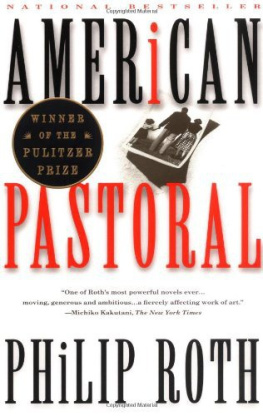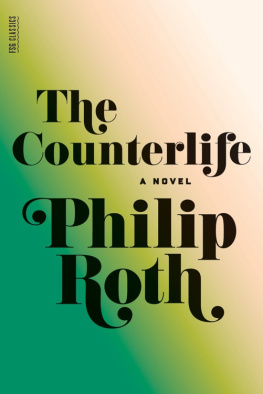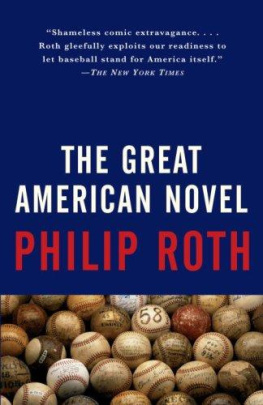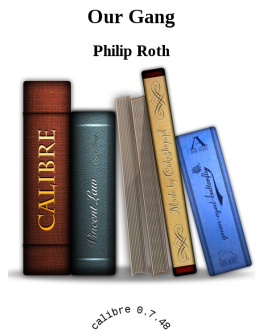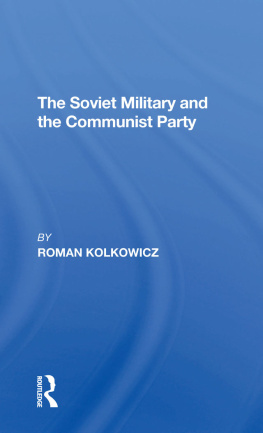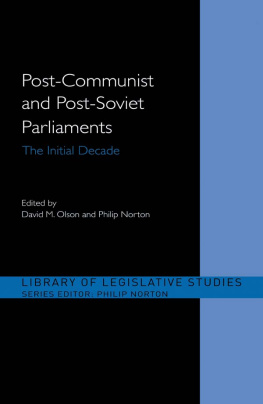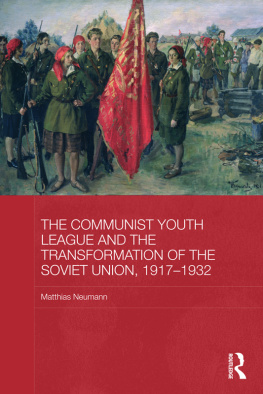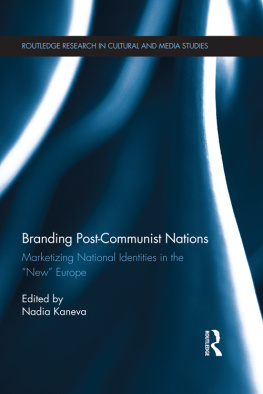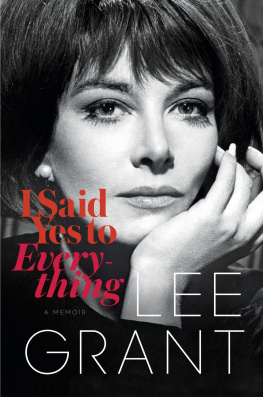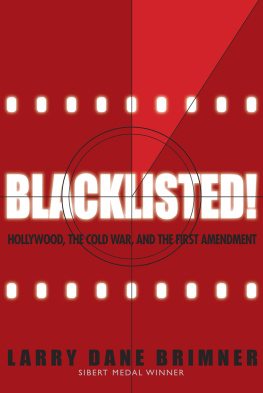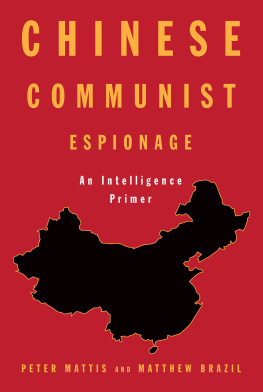HOUGTON MIFFLIN COMPANY
BOSTON NEW YORK
1998
This is a work of fiction. Names, characters, and incidents
are the product of the author's imagination, except in the case
of historical figures and events, which are used fictitiously.
Copyright 1998 by Philip Roth
All rights reserved
For information about permission to reproduce selections from
this book, write to Permissions, Houghton Mifflin Company,
215 Park Avenue South, New York, New York 10003.
I Married a Communist is being published by Houghton Mifflin
Company exclusively in the United States, Canada, and the Republic
of the Philippines, and nonexclusively in the rest of the world,
with the exception of the countries of the British Commonwealth.
Library of Congress Cataloging-in-Publication Data
Roth, Philip.
I Married a Communist / Philip Roth,
p. cm.
ISBN 0-395-93346-3
I. Title.
PS 3568. O 855118 1998
813'.54dc21 98-16797 CIP
Printed in the United States of America
Book design by Robert Overholtzer
QUM 10 9 8 7 6 5 4 3 2 1
The author wishes to thank the Newark Public Library and its director,
Alex Boyd, for use of its archival resources; to recognize particularly the
generosity of the library's city historian, Charles Cummings; to thank New
Jersey historian John Cunningham for his guidance; and to acknowledge,
as a primary source, Newark's Little Italy: The Vanished First Ward, by
Michael Immerso (Rutgers University Press, 1997). The name Katrina Van
Tassel is taken from "The Legend of Sleepy Hollow" by Washington Irving.
Lines from On a Note of Triumph by Norman Corwin are reprinted by
permission of the author. "With thee, in the Desert" (Poem 209) by Emily
Dickinson is reprinted by permission of the publishers and the Trustees
of Amherst College. From The Poems of Emily Dickinson, Thomas H.
Johnson, ed. Cambridge, Mass.: The Belknap Press of Harvard University
Press, copyright 1951, 1955, 1979, 1983 by the President
and Fellows of Harvard College.
To my friend and editor
VERONICA GENG
19411997
Many songs have I heard in my native land
Songs of joy and sorrow.
But one of them was deeply engraved in my memory:
It's the song of the common worker.
Ekh, lift up the cudgel,
Heave-ho!
Pull harder together,
Heave-ho!
" Dubinushka," a Russian folksong.
In the 1940s performed and recorded,
in Russian, by the Soviet Army Chorus
and Band.
1
I RA RINGOLD'S older brother, Murray, was my first high school English teacher, and it was through him that I hooked up with Ira. In 1946 Murray was just back from the army, where he'd served with the 17th Airborne Division at the Battle of the Bulge; in March 1945, he'd made the famous jump across the Rhine that signaled the beginning of the end of the European war. He was, in those days, a crusty, brash, baldheaded guy, not as tall as Ira but rangy and athletic, who hovered over our heads in a perpetual state of awareness. He was altogether natural in his manner and posture while in his speech verbally copious and intellectually almost menacing. His passion was to explain, to clarify, to make us understand, with the result that every last subject we talked about he broke down into its principal elements no less meticulously than he diagrammed sentences on the blackboard. His special talent was for dramatizing inquiry, for casting a strong narrative spell even when he was being strictly analytic and scrutinizing aloud, in his clear-cut way, what we read and wrote.
Along with the brawn and the conspicuous braininess, Mr. Ringold brought with him into the classroom a charge of visceral spontaneity that was a revelation to tamed, respectablized kids who were yet to comprehend that obeying a teacher's rules of decorum had nothing to do with mental development. There was more importance than perhaps even he imagined in his winning predilection for heaving a blackboard eraser in your direction when the answer you gave didn't hit the mark. Or maybe there wasn't. Maybe Mr. Ringold knew very well that what boys like me needed to learn was not only how to express themselves with precision and acquire a more discerning response to words, but how to be rambunctious without being stupid, how not to be too well concealed or too well behaved, how to begin to release the masculine intensities from the institutional rectitude that intimidated the bright kids the most.
You felt, in the sexual sense, the power of a male high school teacher like Murray Ringoldmasculine authority uncorrected by pietyand you felt, in the priestly sense, the vocation of a male high school teacher like Murray Ringold, who wasn't lost in the amorphous American aspiration to make it big, whounlike the school's women teacherscould have chosen to be almost anything else and chose instead, for his life's work, to be ours. All he wanted all day long was to deal with young people he could influence, and his biggest kick in life he got from their response.
Not that the impression his bold classroom style left on my sense of freedom was apparent at the time; no kid thought that way about school or teachers or himself. An incipient craving for social independence, however, had to have been nourished somewhat by Murray's example, and I told him this when, in July 1997, for the first time since I graduated from high school in 1950, I ran into Murray, now ninety years old but in every discernible way still the teacher whose task is realistically, without self-parody or inflating dramatics, to personify for his students the maverick dictum "I don't give a good goddamn," to teach them that you don't have to be Al Capone to transgressyou just have to think. "In human society," Mr. Ringold taught us, "thinking's the greatest transgression of all." "Cri-ti-cal think-ing," Mr. Ringold said, using his knuckles to rap out each of the syllables on his desktop, "there is the ultimate subversion." I told Murray that hearing this early on from a manly guy like himseeing it demonstrated by himprovided the most valuable clue to growing up that I had clutched at, albeit half comprehendingly, as a provincial, protected, high-minded high school kid yearning to be rational and of consequence and free.
Murray, in turn, told me everything that, as a youngster, I didn't know and couldn't have known about his brother's private life, a grave misfortune replete with farce over which Murray would sometimes find himself brooding even though Ira was dead now more than thirty years. "Thousands and thousands of Americans destroyed in those years, political casualties, historical casualties, because of their beliefs," Murray said. "But I don't remember anybody else being brought down quite the way that Ira was. It wasn't on the great American battlefield he would himself have chosen for his destruction. Maybe, despite ideology, politics, and history, a genuine catastrophe is always personal bathos at the core. Life can't be impugned for any failure to trivialize people. You have to take your hat off to life for the techniques at its disposal to strip a man of his significance and empty him totally of his pride."
Murray also told me, when I asked, how he had been stripped of his significance. I knew the general story but little of the details because I began my own army stintand wasn't around Newark again for yearsafter I graduated college in 1954, and Murray's political ordeal didn't get under way until May 1955. We started with Murray's story, and it was only at the end of the afternoon, when I asked if he'd like to stay for dinner, that he seemed to feel, in unison with me, that our relations had shifted to a more intimate plane and that it wouldn't be incorrect if he went on to speak openly about his brother's.
Next page

